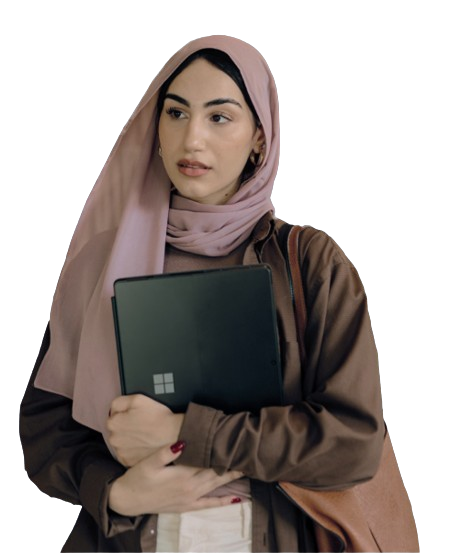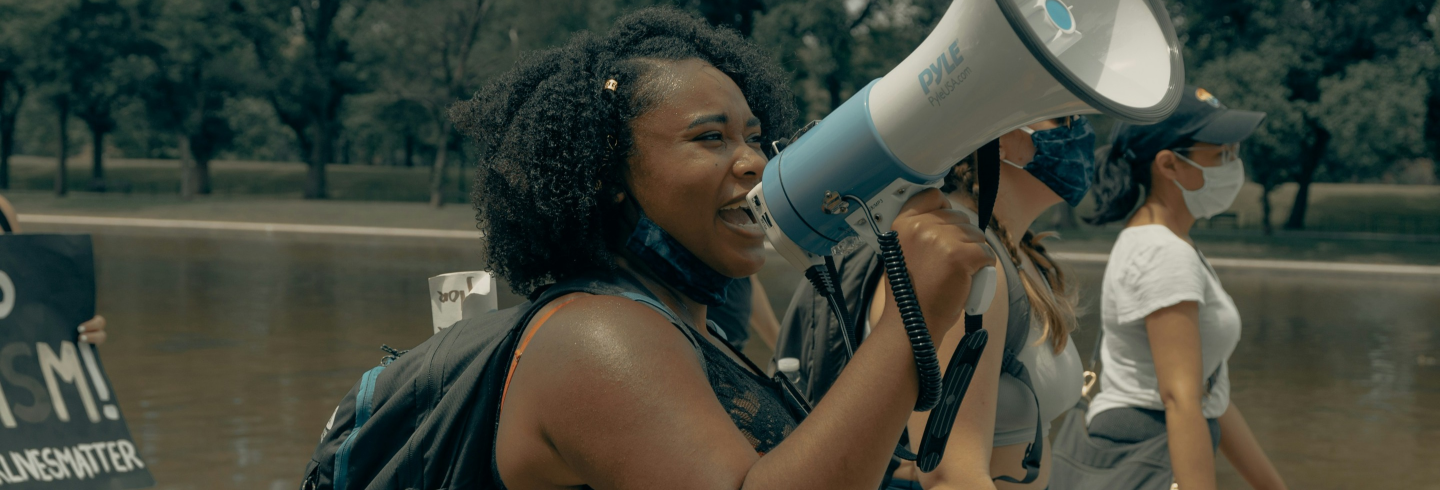The Center on Gender Justice & Opportunity at Georgetown Law is excited to share a new animated video that brings to life the poignant poem “I Can’t Breathe” by Makayla Rivera, our esteemed Youth Storyteller in Residence.
Makayla’s poem focuses on young people’s experiences navigating the presence of police in schools, offering a compelling narrative on the realities faced by students of color in America.
The poem serves as a medium for Makayla’s powerful voice and a companion piece to our latest report, “Fulfilling the Promise: A Blueprint to Build Police-Free Schools.” This report outlines actionable steps toward creating safer, more inclusive educational environments for all students.
Learn more about Makayla and her inspiration as she wrote “I Can’t Breathe” and what she hopes you’ll feel after watching the video.
Makayla’s poem focuses on young people’s experiences navigating the presence of police in schools, offering a compelling narrative on the realities faced by students of color in America.
The poem serves as a medium for Makayla’s powerful voice and a companion piece to our latest report, “Fulfilling the Promise: A Blueprint to Build Police-Free Schools.” This report outlines actionable steps toward creating safer, more inclusive educational environments for all students.
Learn more about Makayla and her inspiration as she wrote “I Can’t Breathe” and what she hopes you’ll feel after watching the video:
Tell us about yourself.
Makayla: I’m Makayla Rivera, from West Orange, New Jersey, the author of “I Can’t Breathe.” I’m 18 years old, a senior at West Orange High School, and next year, I’ll be a freshman at Spelman College, where I hope to study African American Studies. I’ve been a poet since I was 12 years old, and I’m also President of the Black Student Union at my school, the author of a poetry book titled Prayers to Catch a Butterfly, and a rising Black activist.
Thank you, Makayla. Could you tell us how you first got into poetry and heard about the Center on Gender Justice & Opportunity at Georgetown Law?
Makayla: I’ve always had a natural passion for poetry and songwriting. I remember being young and coming up with original pieces I would show my family for fun. As I got older and developed an interest in social justice, I realized the power of combining art and activism. I saw how my words and stanzas could make people feel things, giving me a voice I always felt I didn’t have as a Black woman in America. So, after I discovered that I fell deeply in love with poetry, I specifically fell in love with poetry that spoke for a cause. I then started doing local performances, drafting poems for my first book, and working for the Center on Gender Justice & Opportunity at Georgetown Law. I learned about the Center through a close friend and inspiration, Marley Dias. As a fellow Black activist and writer, Marley saw something in me and connected me with the organization.
Now, I’d like to ask you about “I Can’t Breathe” — what inspired you to write the poem?
Makayla: I was told that the Center would be releasing research on the negative impact and history of SROs within schools, and I immediately knew how I wanted to tell this story. I wanted to give a real voice to the students and kids who have been silenced within the places that are supposed to teach them to speak out. I wanted to tell real stories based on the actual emotions and anecdotes of my peers and students who looked like me. Growing up in the New Jersey public school system, I could write somewhat from experience. Fortunately, my school is on the more affluent side of public schools in my area. However, I have some friends in predominantly Black, lower-income schools from whom I took direct quotes and stories for the poem. In researching this poem, I looked into the different experiences of students in my area. I unfortunately found that the higher the Black and Latinx population in the school, the higher and more severe the policing seemed to be. A common consensus amongst the students I spoke to and myself regarding police presence in our schools was a sort of suffocating feeling we all shared. I wanted to give various perspectives on that feeling of limited freedom. That feeling of being trapped within a box — whether based on bias, stereotype, or the preconceived notions implied by the presence of S.R.Os. I wanted to give a voice to this feeling and help people glimpse what that feels like for kids like me.
What do you want people who watch the video to know or feel after watching the animated video?
Makayla: After watching the video, I want people to feel that suffocation. I want people to understand how it feels to be stripped of innocence and freedom. I want people to understand what it’s like to feel your story is already written for you. Like there is no way out of a cycle that only wants to keep you down. And if I can give people an understanding of that feeling, I can make a change. The greatest blockage to change is a lack of empathy and understanding. I hope this video makes you feel sympathy, anger, and passion. And I hope that with those feelings, people will be motivated to look at the work done by the Center on building police-free schools. I hope this video opens viewers’ minds, pulls on their heartstrings, and ignites a desire to help these students struggling to breathe. I hope my video brings all my peers and me closer to freedom.
What are you hopeful for as you get ready for college next year?
Makayla: So, I am lucky enough to be going to Spelman College next year, which is the number one historically Black college in the nation, so that is super exciting. Spelman is a college with all Black women, allowing me to have a strong sense of community, sisterhood, support, and understanding. I am very hopeful about all of that. Hopeful to be represented, hopeful to feel free, and hopeful to finally not feel out of place or looked down upon for simply being who I am.
Makayla, you’re an inspiration to us at the Center. We can’t wait to see big things in your future — and we encourage everyone to watch our animated video for Makayla’s poem “I Can’t Breathe.”
This animated video brings to life the poignant poem, “I Can’t Breathe” by Makayla Rivera, our esteemed Youth Storyteller in Residence. The animation serves both as a medium for Makayla’s powerful voice and also as a companion piece for our latest report, “Fulfilling the Promise: A Blueprint to Build Police-Free Schools.”
This report outlines actionable steps toward creating safer, more inclusive educational environments for all students. By watching and sharing this video, you help us spread awareness and foster a deeper understanding of the challenges and opportunities in creating safer, more inclusive school environments for all students.
Join Our Distribution List
Stay informed about The Center on Gender Justice & Opportunity’s impactful work and upcoming events by signing up for our newsletter.



